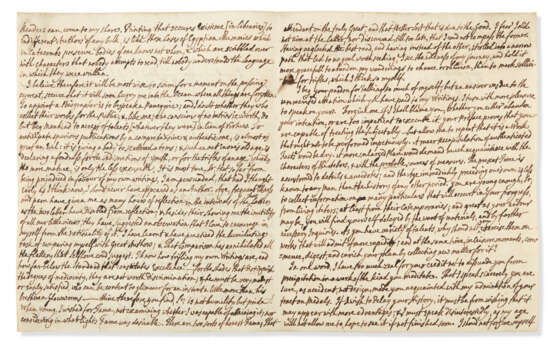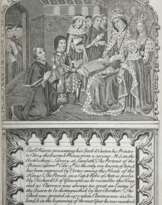ID 993217
Lot 71 | WALPOLE, Horace, 4th Earl of Orford (1717-1797).
Valeur estimée
£ 20 000 – 30 000
Autograph letter signed ('Hor. Walpole') to [John Pinkerton], n.p., [27 October 1784]
31/4 pages, 230 x 184mm, bifolium, seal in red wax remounted at upper right corner of p.1. Provenance: Dawson Turner (1775-1858, banker and collector); his posthumous sale at Puttick & Simpson, 9 Jun 1859, lot 385 (part of four volumes of Pinkerton manuscripts); Bonhams, 22 November 2011, lot 269.
'Had I thought early as I think now, I should never have appeared as an Author': wracked by 'Age, frequent illness, & pain, a disillusioned Walpole contemplates the vanity of his life and literary career. Walpole has given Pinkerton's play to [the dramatist George] Colman. He speaks deprecatingly of his own publications: 'I have published nothing of any size but the pieces you mention, and one or two small tracts, now out of print & forgotten. The rest have been prefaces to some of my Strawberry-editions ... With regard to the Bookseller who has taken the pains of collecting my Writings for an Edition (amongst which I do not doubt but he will generously bestow on me many that I did not write, according to the liberal practice of such compilers) & who also intends to write my Life, to which (as I never did any thing worthy of the notice of the Public, he must likewise be a volunteer Contributor) it would be vain for me to endeavour to prevent such a Design', concluding contemptuously that 'the Insects that prey on carrion, are still more short-lived than the carcasses were from which they draw their nutriment. Those momentary abortions live but a day, and are thrust aside by like embrios'. Walpole goes on to compare the publishing of 'indifferent authors' to 'those cases of Egyptian Mummies which in Catacombs preserve bodies of one knows not whom, & which are scribbled over with characters that nobody attempts to read, till nobody understands the language in which they are written'. He is reluctant to commission a biographer, in spite of the risk of an unsolicited one, and even to commission a collected edition of his works seems futile: 'such an act in one's old age is declaring a fondness for the indiscretions of youth, or for the trifles of an age, which, tho more mature, is only the less excusable'. Walpole confesses that 'had I thought early as I think now, I should never have appeared as an Author ... I have learnt & have practiced the humiliating task of comparing myself with Great Authors; & That comparison has annihilated all the flattery that Selflove could suggest. I know how trifling my own Writings are ...'. Walpole concludes with giving Pinkerton advice on his projected history of the reign of George II, on which he offers some encouragement, though warning of the scale of the task.
The historian, poet, literary imposter, bigamist and bookseller John Pinkerton (1758-1826) had moved to London from his native Scotland in 1781, in which year he published a collection of Scottish Tragic Ballads (some of which, although ostensibly 'ancient', were his own forgeries). 'Pinkerton also pursued other fields of research, including numismatics ... The Essay on Medals [1784] earned Pinkerton the attention of Horace Walpole, with whom he continued to correspond until Walpole's death, after which he sold his recollections of him to be serialized in the Monthly Magazine, and published as Walpoliana in 1799' (ODNB). Walpole's strictures on the activities of biographers in the present letter clearly fell on deaf ears, therefore. This remarkable letter, full of the cynicism and disappointment of Walpole's later years, was first published in The Private Correspondence of Horace Walpole (1820), and then by Dawson Turner in Literary Correspondence of John Pinkerton (1830).
Special notice
This lot has been imported from outside of the UK for sale and placed under the Temporary Admission regime. Import VAT is payable at 5% on the hammer price. VAT at 20% will be added to the buyer’s premium but will not be shown separately on our invoice.
| Artiste: | Horace Walpole (1717 - 1797) |
|---|---|
| Lieu d'origine: | Europe du Nord, Europe, Royaume-Uni |
| Catégorie maison de vente aux enchères: | Lettres, documents et manuscrits |
| Artiste: | Horace Walpole (1717 - 1797) |
|---|---|
| Lieu d'origine: | Europe du Nord, Europe, Royaume-Uni |
| Catégorie maison de vente aux enchères: | Lettres, documents et manuscrits |
| Adresse de l'enchère |
CHRISTIE'S 8 King Street, St. James's SW1Y 6QT London Royaume-Uni | |
|---|---|---|
| Aperçu |
| |
| Téléphone | +44 (0)20 7839 9060 | |
| Commission | see on Website | |
| Conditions d'utilisation | Conditions d'utilisation |





